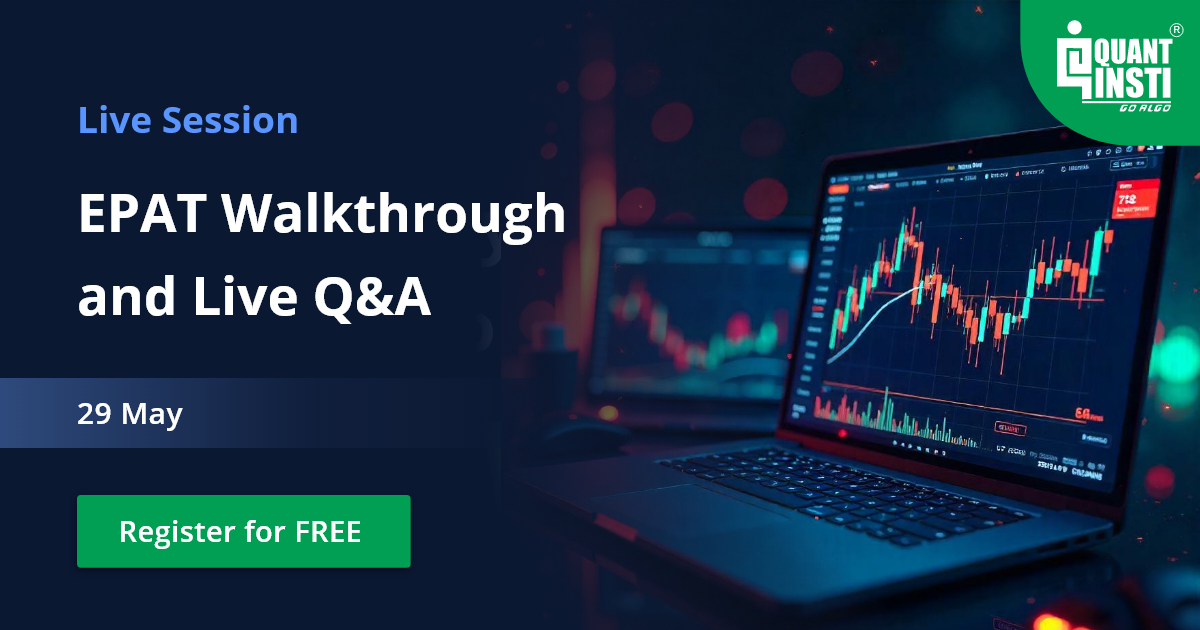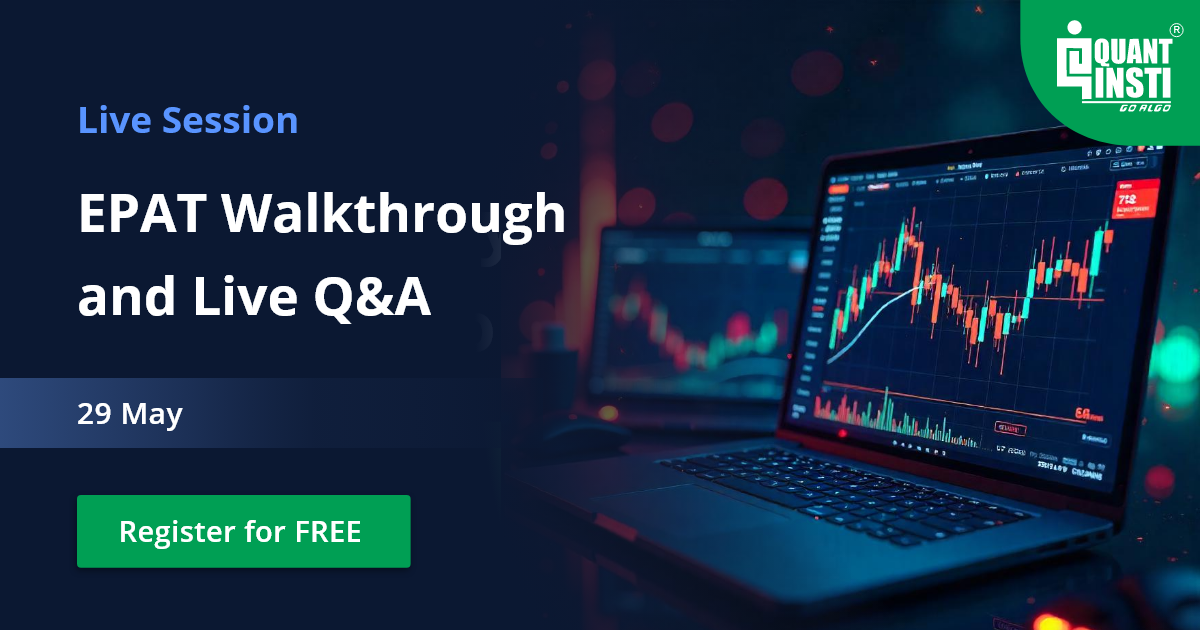It is never too late to keep up with the latest trends. All it takes is some investment - not only monetarily, and physical but emotional investing as well. One needs to put in time from their personal and professional life to get what they want.
Pranay kept himself going, learning, applying and aspiring to achieve what he desired in life. Like he says, by developing an analytical and experimental attitude! Today, a successful Quant, Pranay has had quite an interesting journey that we’d like to share with all our readers.
Here’s our conversation with Pranay:
Hi Pranay! Could you tell us about yourself?
Hi! I’m Pranay Rastogi. I’m presently a Quantitative Analyst at Credit Suisse in Wroclaw, Poland. I have done my Bachelors from Manipal Institute of Technology in Electronics and Communications Engineering.
After that, I cleared the GATE exam. I have done my Masters from IIT Hyderabad in Electrical Engineering.
I like Puzzles, coding and I’m also a Squash player. In the finance industry, I connect and follow a lot of people on LinkedIn who have done their post graduations, doctorates from some of the reputed colleges in the world. I’ve been following them and reading their research papers.
Today, my career is focussed on Research and Quantitative analysis. But as such, I didn’t have a finance background and I wanted to jump into Quantitative Finance eventually, because of which I enrolled for the EPAT programme by QuantInsti through which I learnt about it all.
I built upon this research and I landed a Quant Job in the Finance industry. I have had the pleasure of working with investment banks like Credit Suisse and HSBC as well as HFT firms.
Could you share your work experience with us?
During my EPAT coursework, I got placed in an HFT firm in New Delhi where I got an opportunity to learn the basics of HFT, read tick-by-tick data, performed data analysis and learned how to come up with my own algorithms.
After working for a while, I moved to HSBC in a Quant Analyst position. I got good exposure in the Quantitative Finance domain. I was directly working with the Quants desk team in London and a lot of key players with stakes were involved, I would also deal with the front office desk in London.
My next stint with HFT was with Ogha research as a Quant Developer. In Ogha, I got the opportunity to explore new strategies and trading ideas in HFT set- up. Being quick and reluctant, I felt at ease and started developing and backtesting new strategies and taking them live.
Last year, while exploring jobs outside India, I also got an opportunity to work with Credit Suisse, Poland - in their Quant Strat Team. So, here I am, embarking on the next journey of my professional life.
According to you, how important is the role of research in trading?
There are a lot of players in the markets these days. One has to do a lot of background work, some homework and good research before he deploys the models in the markets. Because it is only then that he’ll get an edge. So, he has to study the market carefully.
Let’s consider this example:
Question: If you get one hour to chop down a tree, what would you do?
Reply: Spend 50 mins sharpening your axe, and then 10 mins to chop down the tree.
So, one has to sharpen his tools and do his research. Once he is good with research, then he can go for modelling and then deploy his models in the market. Of course, there are a lot of prerequisites like indicator grading, testing in the market, etc. But, it requires a lot of research.
Once you get your research paper online, you get a lot of ideas about how people are thinking about the markets, how they are making their models, which parameters are they tweaking, etc.
I think many firms and hedge funds these days are focusing more on Machine Learning technology. This is not an era where a person goes for manual trading. In High-frequency trading (HFT), microseconds and nanoseconds make a lot of difference. So, one has to do a lot of analysis work. So, the interest in Quantitative Analysis is necessary.
This is my approach and that’s what I think.
Would you like to mention some tools and techniques that you’ve used?
In my current role, I’m also using F# since it is functional programming - and priced a lot of securities. Apart from that, we are also using F# for a lot of hedge funds on Wall Street which are using Julia - another functional programming. So, F# comes in quite handy. Very few use F#. Sometimes C++ is also used.
Like I mentioned initially, C++ and Python are the most used programming languages and tools in the industry. I prefer C++ of course, it is the go-to language for me.
I’ve used Python with Pandas, Numpy, Tensorflow and Scikit learn to come up with models. Apart from that, a lot of hedge funds and industry are using Python for their Quant work, for pricing, and mainly - for the HFT Systems.
For prototyping, for data analysis, backtesting of trading strategies - one can go for Python. Why?
- since it is open-source,
- a lot of help is available online,
- a lot of libraries are out there,
- andit is the go-to language when one wants to go for ML, and
- areas of Data Science
Of course, there are other languages available like R and MATLAB, but in terms of online help and support, Python is the biggest. It also depends on the work which a person is doing. One cannot just deploy Python programs or HFT systems.
You’ve created an Augmented Reality app - Could you tell us about it?
I had taken up a course in IIT in multimedia communications and systems wherein it was required to do a project on the latest technologies. So I made an augmented reality player because of which we won the second-best project award.
One would have to download the Android app, and open it - switch on the camera, take it over the selected images. Now since there is an internal mapping between an image with a particular media, when the camera sees that image, a particular media is activated. It was just an initial model.
What mode of learning do you prefer?
If a person has to be in this particular industry he has to keep updated with the latest happenings and technology in the industry.
For research, I especially look up to Paul Willmott Sykes on Quantitative Finance. These days I’m quite into Deep Learning models using Python. Apart from this, there are also many Quantitative Finance books on volatility, trading, and all which a person can explore.
If I look into my own organization, there are many Quants who have done their PhDs from Imperial College and I usually look up to them, follow them to get knowledge.
Based on your experience in Machine Learning, what are your thoughts on that?
As of now, I still think it is like a black box. There are a few models like Linear Regression,Logistic Regression, but apart from that, I haven’t seen models looking very fine in this industry. However, this field is still new in the Finance domain, and there are a lot of applications of Machine Learning. But, still one of the challenges is the interoperability of the model.
How have you used your knowledge of Algo Trading in your life?
EPAT had a large significance for me because I didn’t have any knowledge about Quantitative Finance and it gave me a ladder to enter the Quantitative Finance industry. I actually covered my basics initially - what is a call option, what is a put option, pricing of options, etc.
The best part was doing a project at the end of the course. The lecturers and mentors were always ready to help. When I needed help with the pricing of an option - Mr Nitin Aggarwal. He has a lot of knowledge in this regards.
This is something which I really like about QuantInsti - Even if a person has completed his course, you offer services and benefits and benefits for them.
So, part of me is grateful to EPAT.
Do you have any message for aspiring Quants?
Develop an Analytical Mindset and an Experimental Analytical Attitude
It is not like you are given particular steps to do a particular task. You have to go deep and beyond, explore a lot of ways, then only you’ll be a successful Quant. It’s more about research - not only limited to referring to research papers, you have to experiment a lot, do stuff on your own, and it then that you’ll get a lot of ideas.
You’ll fail sometimes, you’ll get some experience, and you’ll try again. Few quite obvious qualities like hard-working, keep yourself updated with the latest technologies and trends.
And all the best!
Thank you for your time, Pranay, and connecting with us from Poland. We wish you lots of continued success and growth.
In one's quest to upgrade the knowledge of Algorithmic Trading, one needs to be equipped with the requisite knowledge and the necessary skills. Our Executive Programme in Algorithmic Trading (EPAT®), helps you achieve your learning goals. EPAT is a comprehensive course covering topics ranging from Statistics & Econometrics to Financial Computing & Technology including Machine Learning and more.
Disclaimer: In order to assist individuals who are considering pursuing a career in algorithmic and quantitative trading, this case study has been collated based on the personal experiences of a student or alumni from QuantInsti’s EPAT® programme. Case studies are for illustrative purposes only and are not meant to be used for investment purposes. The results achieved post completion of the EPAT® programme may not be uniform for all individuals.


